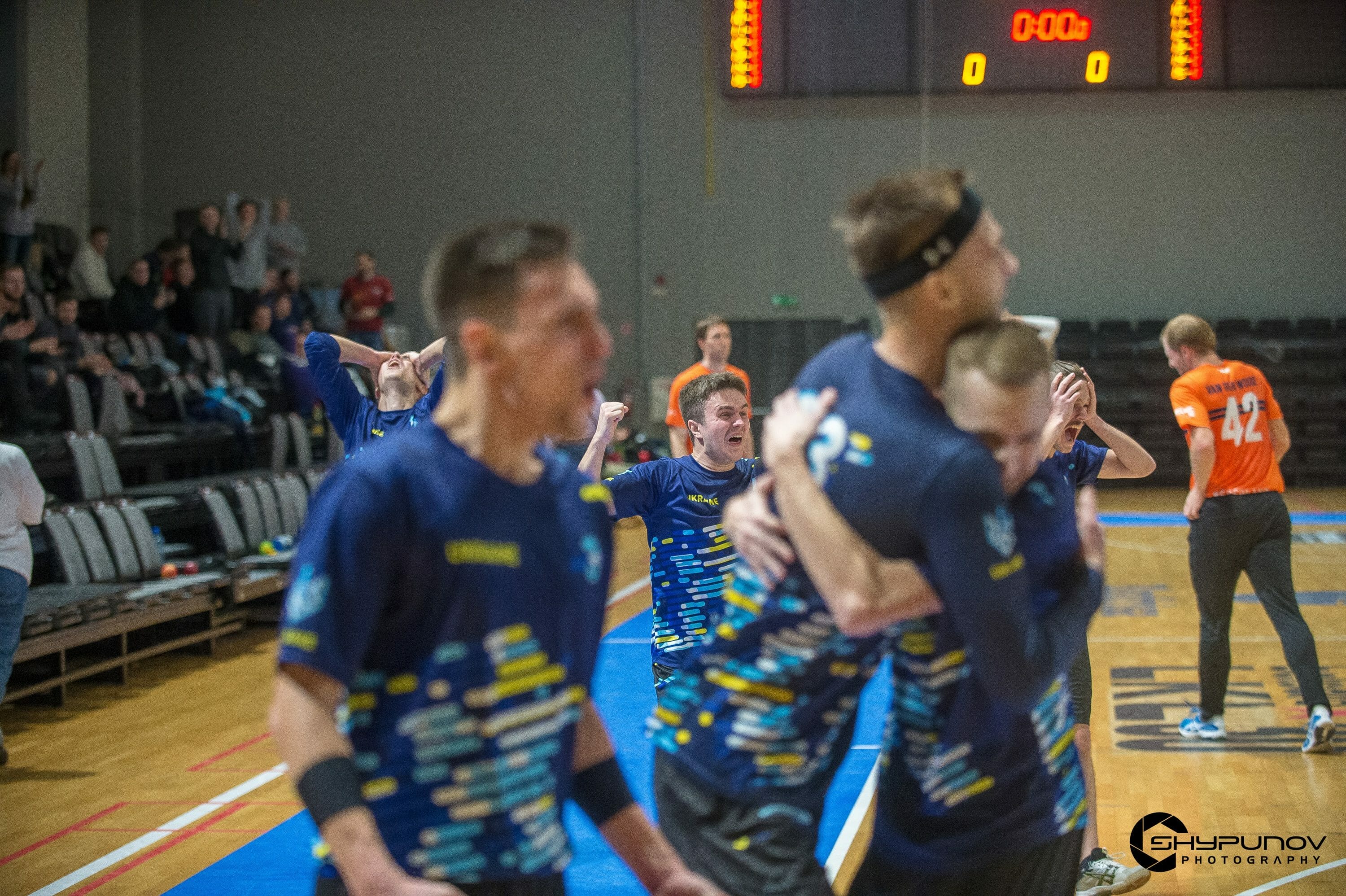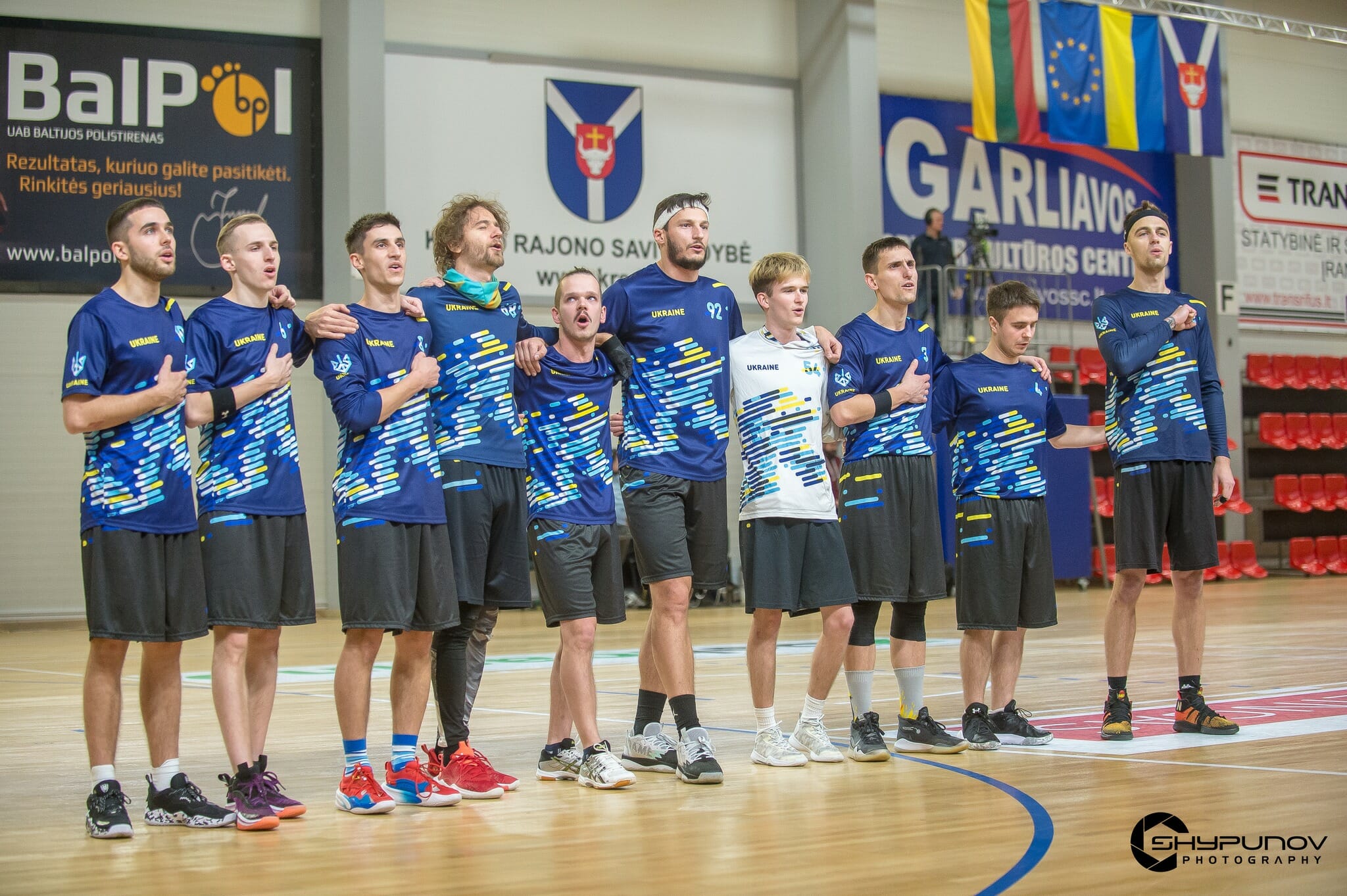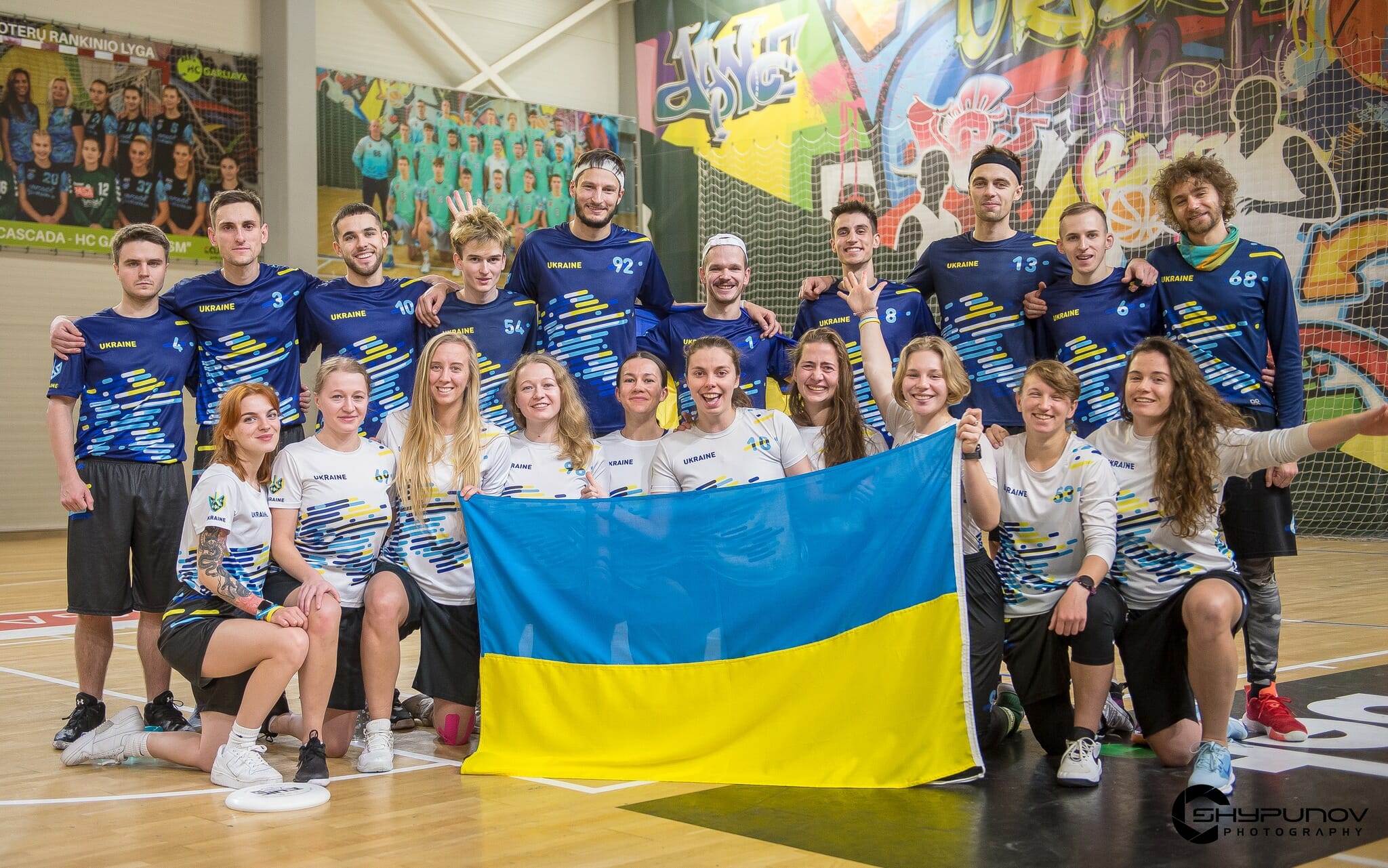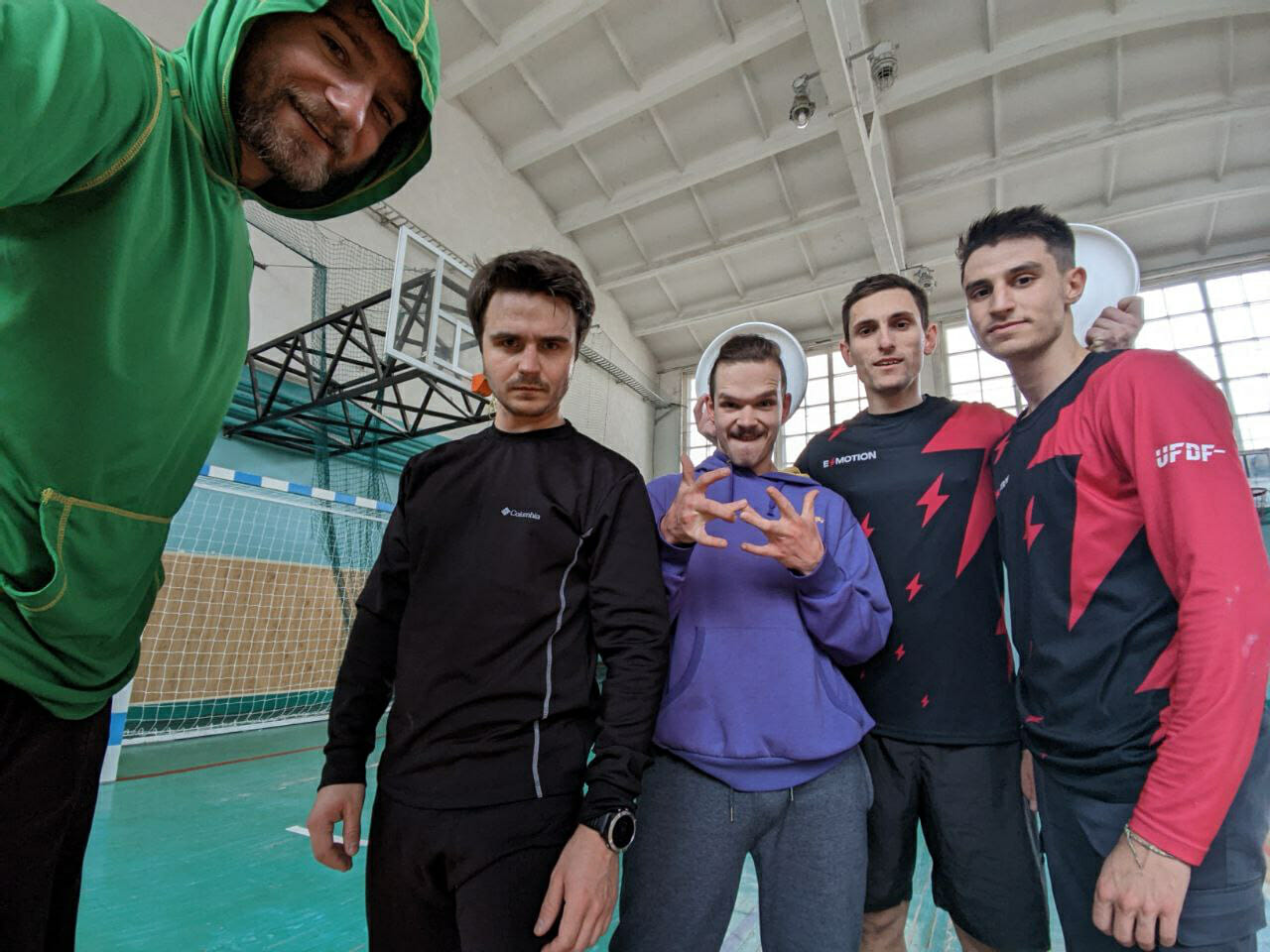An inspiring story of dedication to the sport
December 16, 2022 by Ned Garvey in News with 0 comments

“Thanks for the game, guys. We want to tell you a little bit about our preparation for this tournament. We trained under air raid sirens. We trained with no power. With no light. By candlelight. We trained knowing we wouldn’t be able to shower,” said Ukraine open captain Slava Horbatiuk after the bronze medal match in the open division of the European Ultimate Indoor Championships, a game in which I played on the opposite side.
Due to constant Russian strikes on Ukraine’s critical civilian infrastructure, citizens around the country are often left without power, heating, or water. Even when cities do have all of those things, the government often has to resort to strategic blackouts and outages in an effort not to overload what functioning infrastructure they do have.
I cover the war for a living, but it was still a moment that left me speechless, struggling to figure out how to speak next. It was a moment some of my teammates later admitted left them with tears in their eyes.
Coming into the weekend in Kaunas, Ukraine were seeded eleventh, and I don’t think anyone could have blamed them if they’d stuck with their initial seeding. But they didn’t. Over the course of three days, they played their way into the semifinals, and to an eventual fourth place finish. To anyone who caught their games (and I really recommend that you watch some if you haven’t), it’s plain to see they were one of the most exciting, if not the most exciting, teams in the tournament. They played with absolute trust and confidence in each other, launching blades, hammers, and scoobers from all four corners of the hall, and everywhere in between.
After their games finished, I sat down with Ukrainian captains Andrew Chulii and Slava Horbatiuk to discuss their team’s journey.
The road to Lithuania
Since the imposition of martial law in Ukraine as a response to Russia’s full-scale invasion of the country on February 24th, Ukrainian men of military age have been unable to leave the country without being granted special permission. Thus, the team’s road to EUIC 2022 began with the Ukrainian Flying Disc Federation applying for permission to send a team. Because of the timeline, the team had to start training for the tournament without knowing if they’d even be allowed to go.
And not all of them were allowed to go. Because some of their players hadn’t participated in the most recent national championships, they weren’t eligible to get permission to leave. One of Chulii’s long-time club teammates, Vlad, was also unable to make the trip because he’s currently serving in Ukraine’s armed forces. In fact, he joined the armed forces a few months ago, at the end of the summer. Andrew described him as one of the team’s emotional leaders, “a strong, strong player, a guy we all trust. We’re sad he couldn’t make it, but we appreciate his choice.” According to Andrew, Vlad is currently in Latvia receiving training.
As for the trip itself, the players are allowed a few days for travel on either side of the tournament, but they’re required to be back in Ukraine by December 14th. When asked what it felt like to leave Ukraine for the European Union, the two captains described their great sense of contrast as they crossed the border, “You cross the border and you see lights everywhere. They have everything: lights, food, heat. It’s so different.”
Training and EUIC 2022
As Horbatiuk noted after our game, the Ukrainian team often trains without basic amenities. They train under whatever conditions they can. They train by themselves, by candlelight, in the dark, when the water is shut off, and under air raid sirens. Because they know they can’t train the way most European teams can, they do what’s possible, not what they want to do. Andrew told me he went out to throw one day when the air raid siren went off. He said that either you go to the bomb shelter while something may or may not happen (and maybe spend a lot of your daylight there), or you decide to take the risk. On this particular day, he decided to keep throwing despite the risk. He forgot about the alert until, boom, he heard an explosion in the distance. It was the Russian military hitting a power station in Lviv.
Both Chulii and Horbatiuk said they’d never be able to forget the sounds, the feelings, the danger, and the fear. They said it’d all stick with them for the rest of their lives. When you can be wounded or killed at any moment, you just do what you have to do.
To practice ultimate, they booked space in a sports hall in Ivano-Frankivsk (a city in Western Ukraine) where four of the 11 players currently live. However, because they couldn’t meet for regular practices, they planned three weekend training camps in the city: two two-hour sessions per day, 24 hours of total practice time as a team. Of course, it was impossible to know if they’d actually be able to train. If the air raid siren were to go off during their session, they’d have to stop until the all clear was given. Lucky for them, the siren never went off during their sessions.
Although, there was one incident. After one of their training weekends, the team’s Kyiv contingent took the train back to the capital. Around the time he knew his teammates would be in the station, Slava saw reports of a missile strike there. Immediately, he fired off a message in the team’s Telegram chat to check on everyone. No reply, someone’s missing. Panic set in. Eventually, the group got a response. Everything was okay, Vlad had left the station ten minutes before the attack, but was unable to respond without internet access.
Understandably, they blame the war for some of their mistakes on the field. The team feels that they could compete against the best teams in Europe were it not for the war, and a fourth place finish after ten months of hell makes that a hard point to argue against. No team came to Kaunas with more fire than the Ukrainians. Together with their women’s team, they even belted out the Ukrainian national anthem before their bronze medal match.
That togetherness got them through a tough opening day. After dropping close games to Great Britain and Sweden, they held off a strong Latvia 2 squad to reach the quarter finals. Against the Netherlands, they won on universe point after an incredible grab from Vladyslav Zavalenko to maintain possession outside of the endzone. In their semifinal, they were seen off by Finland, despite an early second half surge.

The Ukrainian community
Chulii and Horbatiuk made sure to mention the support the team has received from the Ukrainian ultimate community, something made all the more special, and all the more difficult, given the circumstances. As of now, there are around 20 community members working on the defense of Ukraine, be it in the Territorial Defense Forces, the National Guard, or the Armed Forces of Ukraine. Those community members lent their support to the team, as they sent their kind words from across the country, words that mean even more when you don’t know whether you’ll ever see each other again.
But that support goes both ways. Recently, the community raised around $4,000 from inside and outside Ukraine to buy supplies for those in service. They were able to buy equipment, gear, and drones for “their guys.”
What they want you to know
Asked what they wanted you, the reader, to know, Chulii and Horbatiuk, speaking for the rest of the Ukrainian community, replied, “We want you to know the truth about what’s happening in Ukraine. We want you to know that nothing can excuse the Russian invasion of our country. We want you to know about the horrible things the Russian army has done. We want you to know that our country is making sacrifices for all of you in Europe. We want you to know that what we do is only possible because of European [and other] support.”
“We also want you to know how you can help.”

